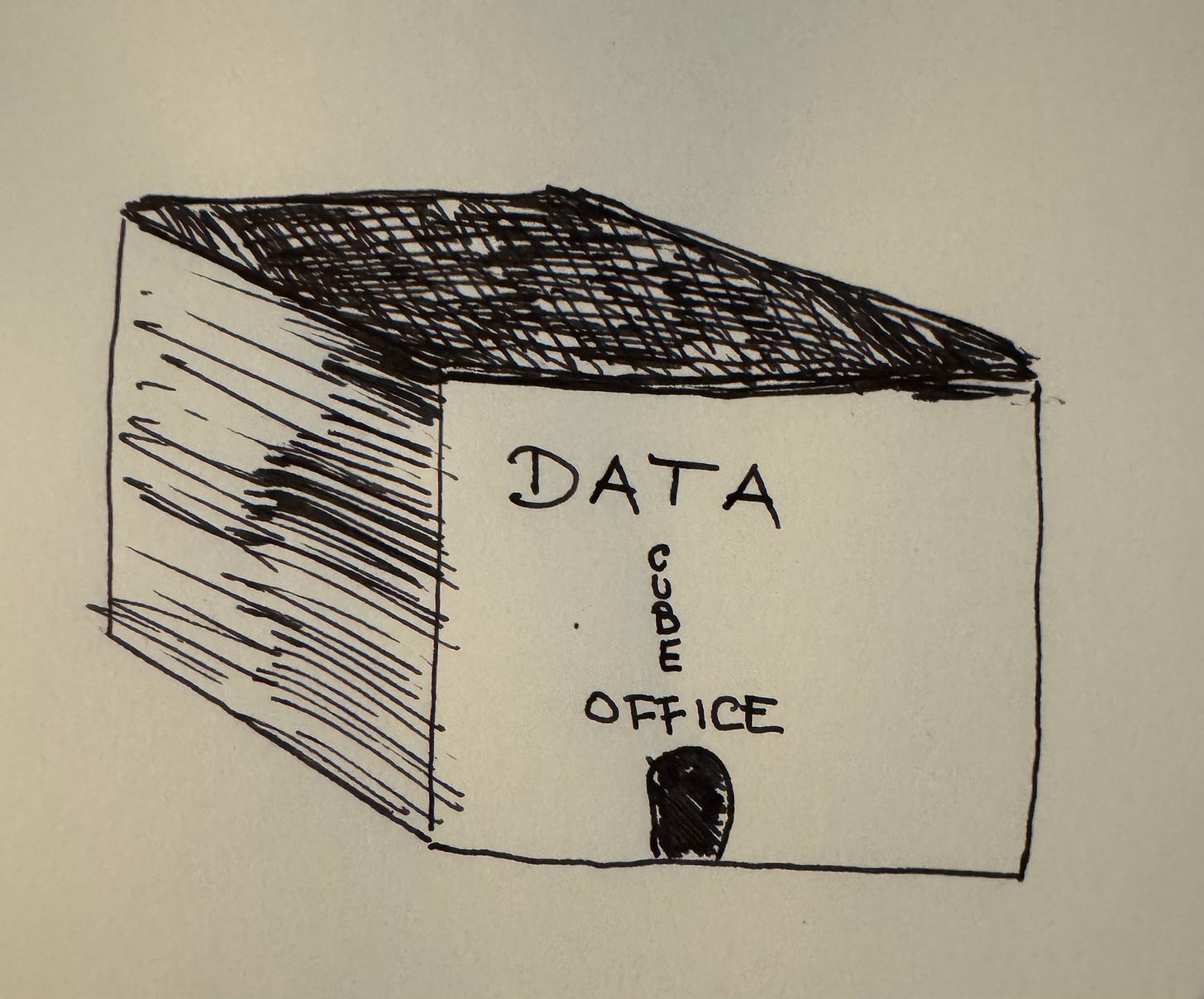Human chats in a data driven corporation
This is an imaginary dialogue that can occur in any major tech corporation. It’s made up but it’s hardly unrealistic, meaning that some of the events mentioned could very well apply somewhere in real life. If nothing else, based on my personal knowledge I can tell they are not far from reality.
Directly or through stories I’ve heard first hand, the events in this scenario should be seen through the eyes of the current “AI-fication” (made up word) of processes. Automating everything via AI to improve efficiency. Efficiency, however, is a tricky word when measured at a large scale.
Identifying what can tell us what we are doing bad and guide us to what we could do better is a path full of temptations. A path full of small inefficiencies that we could fix. Sometimes we want to fix.
But not all inefficiencies should be fixed. Because micro-optimisations or optimisations not on bottlenecks do not improve the overall efficiency of a process and can, and likely will, impact the overall ability to improve its efficiency.
In other words, if you are developer, would you optimise the format printing of a logging method in a program that doesn’t even compile? Probably not. Unless you are ignoring your environment. You are focusing on a smaller area. Maybe if you know someone else will fix the compiling issue, then you could just avoid context switching to jump and fix the issue. It depends how the company works. How you work.
The dialogue is between Sarah and Gustav. Both developers in a large tech corporation.
It’s a grey Tuesday in a suburban office of a cube like building in the middle of the flat lands. The night rain left a sticky mud smell in the air.
The office kitchen beams a low diffuse light. More of a result of cheap lighting choices than an intent of creating a chill mood.
Gustav seats at the table with a hot mug of black coffee. He is checking his notes in his small green agenda. Sarah jumps out of the shadow of his eyes and cheerfully wished:
S: Good morning!
G: Hey, good morning! How is it going?
S: Well, have you read the email leadership sent?
G: Which one?
S: The one about the efficiency improvement initiative (EII).
G: The what?
S: We need to ship code faster and better.
G: No surprise there. So what’s new?
S: They will start tracking metrics around code changes.
G: Oh god. Are they gonna count the number of commits?
S: No, that no. But… they will check the number of pull requests (PRs).
G: Ah.
S: Yeah.
G: But why?
S: Things are not being built faster enough.
G: Tell me something I don’t know… If I have another meeting to align with the new strategy while I wrap up the changes I have going for the previous strategy. I’m juggling between strategies. But that’s the strategy I guess.
S: Well at least you will have something to build! I have been patching things left and right without understanding much of what’s going on. Things keep breaking and I have to fix them.
G: Yeah, I feel your pain. Are you worried about the PRs count?
S: Well yeah a bit. They say it’s a signal. Something used to guide the search for inefficiencies. I wonder how long it will take until that search finds m…
G: Oh. You should not be so pessimistic. The company would not advertise the whole thing so much if something like this was the case.
S: Why not?
G: People would be horrified!
S: Yeah, some are.
G: If that’s the case then they would have to roll back the program. People would tell them.
S: Yes, and some of us are but like as many others, all I have is this speculation. Nobody has been fired based on that. Yet. But, imagine they start using this number. How will we know for sure? Just last week, that guy, Alex, Alexy, Alexei! He left. But it’s unclear why. Nobody says anything when these things happens. Not to disrupt the work of others and respect privacy. So then what should I do? Should I reach out privately?
G: Yeah, it’s always a struggle.
S: Exactly, but I think maybe it shouldn’t be this way. How much damage has been done with this approach? I don’t know. Probably only the company knows.
G: It’s true, that’s a valid concern. But again you can’t claim the measurement of PRs is a tactic to arbitrarily control people’s work and fire them when no longer producing according to fixed metrics. You don’t know that for sure.
S: I agree. But what I do know is that next week we are taking over Alexei’s projects. So we’ll have to get familiar with those soon.
G: Ugh. Well at least we won’t lack work to do to reach the PRs quota.
S: You wish. We’ll have a 3 days workshop and handover process to distribute work and align with the new priorities.
G: What?! Oh god, those guys!
S: Yeah… sorry I ruined your morning coffee. Well on the good side the unit tests in the build passed last night.
G: Yeah, great, yeah… No worries. I might just go back to put in some code changes. I won’t have much time to code next week.
Gustav leaves an half empty cup of coffee in the sink. Even the alluring appeal of powering through with caffeine the whole disappointing situation couldn’t remove the feeling in the stomach. A slow deep feeling of twisted disgust.
The neon lights buzzed quietly in the hallway.
Gustav sits at the screen. He opens some code files but a slow mumble takes him over.
“Just numbers. Nothing else.”



